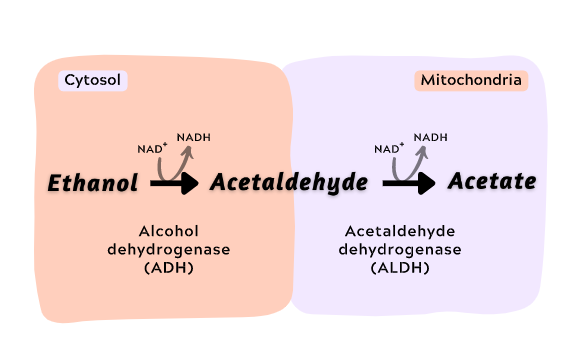

The Gene Identity
Alcohol and Your Genes
Have you ever felt embarrassed when your friends or colleagues teased you about your “red face” after only a few sips of wine? Do you feel extremely uncomfortable and end up with nausea or splitting headache at the end of the night? Maybe one or two nasty people might have thrown the word “weak” at you before because of this? The fact is, the Asian Flush has nothing to do with the strength of your body, but rather a small mutation in your DNA.
The science behind alcohol metabolism
The chemical breakdown of alcohol in the body is controlled by a pathway which includes two enzymes, alcohol dehydrogenase (ADH) and aldehyde dehydrogenase (ALDH) as shown in figure below:

First, ADH metabolizes alcohol to acetaldehyde, a highly toxic substance and known carcinogen. Then, in a second step, acetaldehyde is further metabolized down to another less active by product called acetate by ALDH. Acetate is finally broken down into water and carbon dioxide for easy elimination.
ALDH, is an enzyme that in humans is encoded by the ALDH2 gene located on chromosome 12. A single nucleotide mutation in ALDH2 gene is primarily responsible for the “Asian flush syndrome”, characterized by facial flushing after consuming alcoholic beverages. This is because a “G” to “A” mutation will cause the functionality of the ALDH enzyme to drop to <4% of normal! In response to this increase in acetaldehyde, your body is merely trying to “flash red” to warn you about this toxin.

Common misconceptions among Asians
A common misconception among Asians, in particular people of ethnical Han Chinese believes that the “Asian flush” is a sign of good “chi” or active blood circulation in the body. In reality, it is the presence of a toxin such as acetaldehyde which causes the dilation of the blood vessels. Your body is screaming at you to stop and start hydrating to get rid of the toxin.
Another misconception is that one can try to drink alcohol beverages frequently as practice to be becoming a better drinker. While it is true that the body can be forced to increase its tolerance, this does not decrease the amount of toxic acetaldehyde produced during alcohol consumption. Many also believe that the off-label use of antihistamines such as Zantac or Pepcid can boost their drinking as it prevents alcohol-induced flushing when in fact, it is just slowing down the process. The prolonged use of such medication together with alcohol can have very serious health consequences.
Is the Asian Flush Syndrome the same as being intoxicated?
No, getting red from alcohol due to the Asian Flush does not mean you are drunk or intoxicated. Alcohol intoxication refers to a condition the occurs when a person consumes an excess amount of alcohol at one time. This would affect their physical and mental abilities. The Asian Flush Syndrome does not mean you get intoxicated faster or have increased blood alcohol level. In actual fact, people who suffer from the Asian Flush tend to drink less because of the unpleasant symptoms.
Alcohol Intolerance vs Alcohol Allergy
Alcohol Intolerance is a genetic disorder of the digestive system whereby the person lacks the active aldehyde dehydrogenase (ALDH) enzyme needed to breakdown the toxic Acetaldehyde.
On the other hand, alcohol allergy is due to reaction that is being triggered by your immune system which overreacts to one of the ingredients in alcohol. Although both have some similar symptoms, very often, symptoms of alcohol allergy are much more painful and uncomfortable. For serious cases, if left untreated, an alcohol allergy can be life-threatening.
What can we do?
There is currently no known “cure” for Asian Flush, but there are some steps that we can do to mitigate the effects that it causes. The first and most obvious is to drink less or pace yourself when taking alcohol.
There are also companies that sell natural supplements that claims to support alcohol metabolism, and they can be considered but it may not be a solution that works for everyone.
As the end of the day, you need to be mindful that if you are carrying the mutation in your ALDH2, you are putting a known carcinogen into your body. Be wise and make the correct decision that is best for your health!
About TinyGene and our new Alcohol Metabolism and Genetics Lab
TinyGene Academia, Singapore’s only private science-based STEM educational centre, offers and specialises in STEM programs that aim to inspire young scientists through fun and interactive hands-on experiments.
In our latest Alcohol Metabolism lab, you will learn how to collect your own DNA for a PCR experiment that will tell if you carry the “G” to “A” mutation in your ALDH2 gene. Learn the technology behind genetic testing and get your own results as the same time! There is no age restriction for this lab, and all are welcome to book a session with us.
WhatsApp us at +65 8012 8990 to find out more today!



